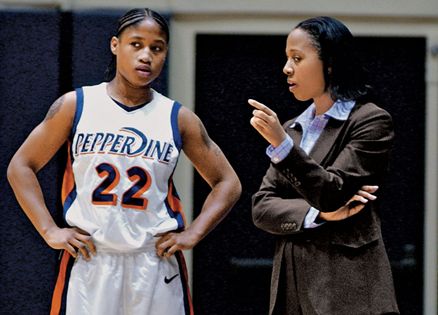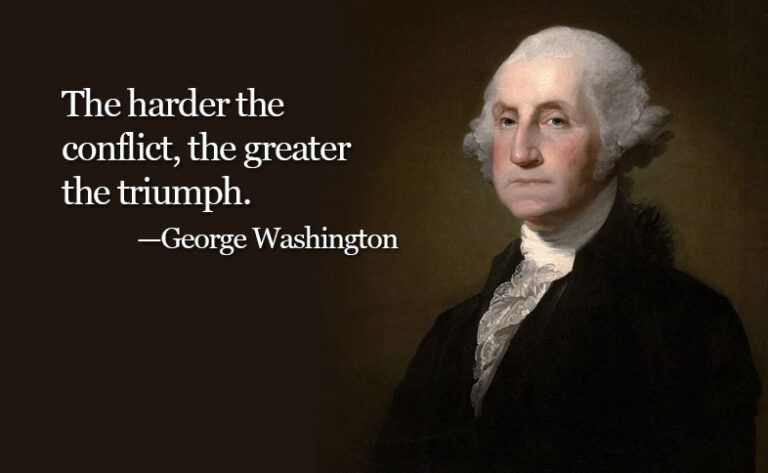Pepperdine might be a Christian university, but there’s nothing quiet and churchlike about basketball games at Firestone Fieldhouse. Our fans know how to make some noise. I’m the women’s basketball coach, and after nine seasons, I still love the way the crowd gets my players—already a competitive and motivated bunch—even more fired up.
I remember when I was their age and all I wanted was to be a top college player and then go on to the WNBA, the women’s professional basketball league. Just because that didn’t happen for me doesn’t mean it won’t happen for some of them. Actually, I did get to the WNBA in a way I had not anticipated at all.
Still, what I think is most important and meaningful about basketball—what I try to teach as a coach—is how it prepares the player for life. Here’s the advice I give my players, lessons I’ve learned myself on and off the court.
Deal with it.
When I was a kid, we moved around a lot—five different cities by the time I was 13. My father was a pastor, and we went wherever he was called to lead a congregation.
City number four was Washington, D.C. when I was at that awkward middle-school age, and painfully shy besides. Why did I have to go through the ordeal again of making new friends, fitting in at a new school and finding someplace to play ball?
One morning I plopped down at the breakfast table, feeling pretty darn sorry for myself. Dad came up behind my chair to fix my hair. I wish Mom were here to do my hair, I thought.
Mom had left the house while I was still sleeping. She got up at 4:00 A.M. every morning to take a 5:00 A.M. bus across town to the school where she taught. Dad was in school himself—a student in seminary—and also the assistant pastor of a local congregation.
That’s when it hit me. My parents never complained about how hard they worked. They just did what had to be done and my brothers and sisters and I benefited from all the sacrifices they made.
Mom made most of our clothes, staying up late at night sewing. She grew her own tomatoes, squash and greens so we would have fresh vegetables.
Today, if one of my players comes to me with explanations and excuses for why something didn’t work, I say, “Let’s go back and do it right.” Feeling sorry for yourself is a dead end. Life is full of challenges. Just deal with it.
Get open…to possibilities.
Baseball was the first sport I loved. Back before Title IX opened the way for girls in Little League, I played on an all-boys’ team. With my hair tucked under my cap, I hoped nobody would notice, although my teammates would sometimes taunt our opponents, “You got robbed by a girl!”
Dad wasn’t crazy about that approach. He said it wasn’t honest; so he insisted on revealing that I was a girl. It forced the League to change its rules and allow me to play. That was a kind of victory that fueled my pursuit of sports even more.
Then we moved to Los Angeles, and Dad’s church, McCarty Memorial Christian Church, had a gym on the second floor. We lived only 20 steps away. By then I’d gotten into basketball and anytime I wanted I could play.
Dad gave me a key to the gym because he was available just a few feet away. Nobody could beat me on that court. I knew every angle, every bounce the ball would take on the hardwood.
Dad brought in gang bangers to play, but they had to follow his rules: no gang clothes, no swearing and prayers before every game. It was amazing how they shaped up—all for a chance to play basketball. It kept many a young man off the streets.
I was good, really good. I figured playing basketball was what God wanted me to do with my life, the way Mom was called to teach and Dad to preach. I got a full scholarship to U.C. Irvine, which I took as confirmation of my calling. Next stop after college? The WNBA.
It didn’t work out that way. I got hardly any playing time, and the coach told me I wasn’t likely to get more. I was devastated. Basketball was my whole identity. My destiny, I thought. What was I supposed to do now? Who was I supposed to be?
I dropped out after freshman year, moved back in with my parents in L.A. and stopped playing ball. For a while I floundered, taking classes at community college, working as a paralegal. Mom’s job at George Washington Preparatory High School kept her busy but not too busy to see how lost I was.
One day she sat me down and said, “Tomorrow, you’re coming to my school and we’re going to put you to work as a teacher’s assistant.” I didn’t know about the job, but after all those mornings I’d missed my mom growing up, I liked the idea of going to work with her.
My first day at the Prep, I was assigned to help an English teacher. She loved her subject and her enthusiasm rubbed off on her students. I saw them soaking up everything she said, and I thought, I want to inspire kids like that. I want to teach. For the first time since I quit basketball, I felt really excited about something again.
Not long after that, the basketball coach, who’d coached me in a summer league a few years earlier, said, “We’ve got practice after school. Why don’t you come to the gym and help me?”
That’s how basketball and teaching came together for me in a new role: assistant coach. It wasn’t what I had planned, but it was what I was meant to do.
Believe in yourself.
Eventually I took over as head coach of the girls’ team at the Prep. One year a very talented freshman came to tryouts. I took her aside. “You definitely have the skills to play for us,” I said. “Problem is, I can’t take you.”
I didn’t have to spell out why. The girl had a one-point-something GPA, which made her ineligible to play, and a spotty attendance record.
But I had this feeling that she came out for the team because deep down, she wanted help. And I’d gotten into coaching to help inspire kids, right? If I wanted to get this girl to believe in herself I’d have to take a leap of faith too.
So I made a deal with her. Three mornings a week, I would pick her up and bring her to school. I’d arrange tutoring and study hall. If she brought her grades up to a 2.0, she could join the team on a probationary basis. “I’m making this commitment to you,” I said. “But the hard work is up to you.”
That left two days a week that she was on her own. At first she didn’t always make it to school or finish her homework those days. It was hard for me not to step in, but I knew she needed to learn to take responsibility for herself. “You’re wasting your time,” one of her teachers told me.
“We’ll see,” I said, praying that my confidence wasn’t misplaced. And what I did see as the semester went on was the girl showing up at school more often, buckling down and hitting the books in study hall. I even caught her in the library occasionally. Progress, I learned, is a process.
Report card day came. She ran into my office and pointed to her 2.1 GPA. I don’t know which one of us was more thrilled. I let her on the team.
“You’re still on probation,” I warned. “Keep those grades up.” Next semester, the girl made a 2.8 GPA. After that, never less than a 3.5. She didn’t make it to the WNBA but she accomplished some thing that makes me even prouder: She went to college, then graduate school, and got her doctorate.
Be there.
Sometimes as a coach the best way to help is to say nothing, give no advice, just be there. After the Prep, I coached in the WNBA and then at the college level, which turns out to be the place I like best.
When I was an assistant at Stanford, a young forward named Nicole Powell was the best player on our team—and one of the best in the country.
She was under enormous pressure to carry the team, and sometimes the demands of being an All-American got to her. On one occasion I saw her struggling during a practice before a really important game.
I walked over to the basket where she was shooting, not sure what to do to help her. Should I have her work on her perimeter shooting? Her ball-handling? Should I say anything?
No, I thought, just be with her. The way my mom would sit with me when I was down or Dad would pray in silence with a church member facing troubles.
Nicole grabbed a ball and hoisted a shot. Swish. I rebounded the ball and tossed it back to her. She shot again. Swish. I tossed the ball back again.
For two hours I threw her the ball, not saying a word. She didn’t need me to hone her technique. She just needed to know that I was there for her, no matter what.
On and off the court, I’ve seen how this is true. People don’t always need us to say anything or fix anything. Sometimes just being with them is enough. It’s like faith—sometimes simply being aware of God’s presence is all you really need.
No excuses.
Every morning at 7:00 I call Mom. Ever since Dad died a couple of years ago, I’ve felt the need to check on her. But then, she checks on me too. We talk about what we’re doing, we pray together and always end by repeating the verse from Psalm 118, “This is the day the Lord has made. We will rejoice and be glad in it.”
The other day I was complaining to her about all the work I had to do. On top of coaching and teaching, I had gone back to school to get a master’s in psychology. I was working on a paper and couldn’t make heads or tails of it.
“Mom, I keep staring at the computer and I still have no idea what to write,” I moaned. “I’m ready to give up.”
Mom didn’t mince words. “You signed up for this course, right? You decided you wanted a master’s in psychology, right? Have you prayed about it? Isn’t this what you feel you need to do?”
To every one of her questions I answered, “Yes.”
“Then you’d better sit down and do it,” she said, and hung up the phone. No excuses. Just deal with it. I sat down at my computer and finished the paper. Got an A. Lesson learned… again. But then the best lessons are the ones we end up learning again and again. Even when you’re a coach.
Download your FREE ebook, Rediscover the Power of Positive Thinking, with Norman Vincent Peale






